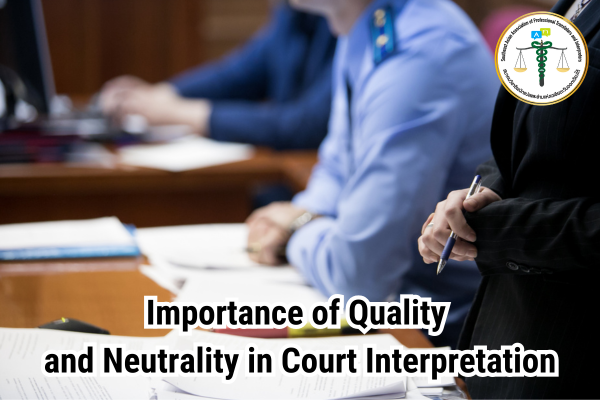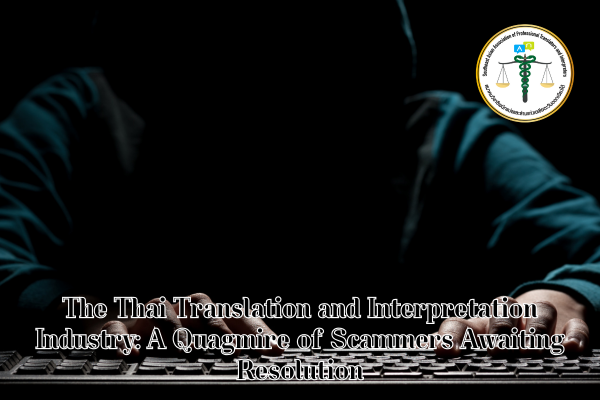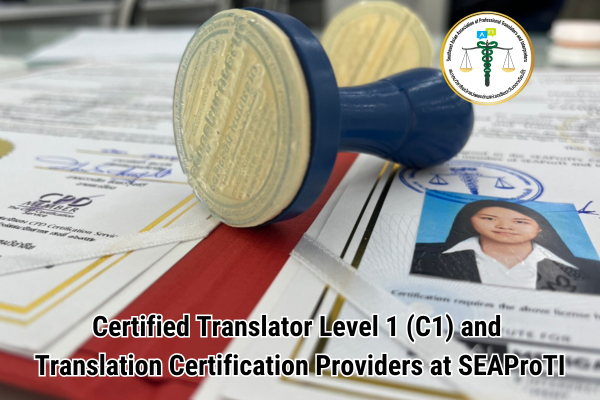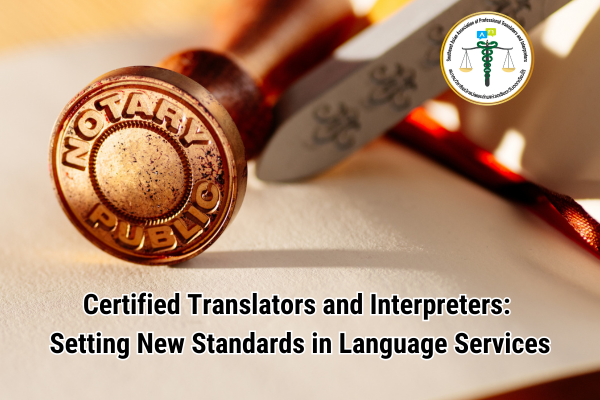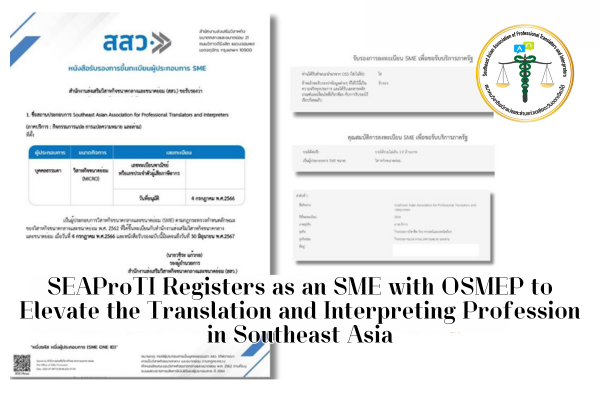The Role of Interpreters in History and the Justice System
26 January 2025, Bangkok – Interpreters have played a vital role in Thai history and the justice system, from past to present. Thailand has long embraced international relations in trade, diplomacy, and culture since the Ayutthaya and early Rattanakosin eras. This openness has made cross-linguistic communication a crucial aspect of interactions with foreigners.
Interpreters in Thai History
Historically, interpreters facilitated language and cultural exchanges between the Kingdom of Siam and other nations. They were categorized into two main groups: interpreters proficient in Eastern languages, such as Chinese and Arabic, and those skilled in Western languages, such as Portuguese and Malay.
Interpreters proficient in Eastern languages were often of Chinese or Arabic descent, rooted in trade relations since the Ayutthaya period. These individuals not only served as interpreters but also held significant government positions, with some ascending to high-ranking noble titles. For instance, the Kairerk family originated from Chinese ancestry, while the Bunnag family traced its lineage to Persia. Meanwhile, interpreters skilled in Western languages, such as Portuguese, were often of Portuguese descent, residing in established Portuguese communities, and played a key role in facilitating communication between Thailand and European nations.
In the reign of King Rama IV, English gained prominence in international relations. The first Thai interpreter fluent in English was Prince Mongkut, who later became King Rama IV.
Interpreters in the Justice System
In the justice system, interpreters serve the critical function of translating languages to ensure accurate understanding in legal cases. This is particularly essential in regions where locals do not understand Thai, such as the southern border provinces, where Malay is the primary language. Having qualified interpreters who deeply understand the languages involved is vital to ensure the rights of all parties in legal proceedings.
Thai laws, such as Section 13 of the Criminal Procedure Code and Section 40 of the Constitution, mandate that courts or relevant authorities provide interpreters for individuals who cannot speak or understand Thai. These laws require interpreters to act impartially and with integrity.
Standards for Interpreters
Interpreters must have a profound knowledge of the languages they translate and a deep understanding of the cultures of both parties. Additionally, they must adhere to ethical standards, avoiding bias or prejudice, and translate every word faithfully without omission or addition. Interpreters must also be well-versed in legal proceedings to ensure seamless and accurate communication.
Linguistic Diversity in Thailand
Thailand is rich in linguistic diversity. While Central Thai serves as the national language, each region has its own distinctive dialect, such as Malay in the South or Northern Thai in the North. This linguistic variety reflects the charm of Thailand’s culture, deserving preservation and study.
Conclusion
Interpreters are more than just language translators—they are bridges connecting understanding between people and cultures. Their role in Thai history and the justice system highlights the importance of accurate and fair communication, which is foundational to social harmony and international relations.
SEAProTI’s certified translators, translation certification providers, and certified interpreters:
The Southeast Asian Association of Professional Translators and Interpreters (SEAProTI) has officially announced the criteria and qualifications for individuals to register as “Certified Translators,” “Translation Certification Providers,” and “Certified Interpreters” under the association’s regulations. These guidelines are detailed in Sections 9 and 10 of the Royal Thai Government Gazette, issued by the Secretariat of the Cabinet under the Office of the Prime Minister of the Kingdom of Thailand, dated July 25, 2024, Volume 141, Part 66 Ng, Page 100.
To read the full publication, visit: the Royal Thai Government Gazette
บทบาทของล่ามในประวัติศาสตร์และกระบวนการยุติธรรม
26 มกราคม 2568, กรุงเทพมหานคร – ล่ามมีบทบาทสำคัญในประวัติศาสตร์ไทยและในกระบวนการยุติธรรมตั้งแต่อดีตจนถึงปัจจุบัน ประเทศไทยมีการเปิดรับความสัมพันธ์ระหว่างประเทศทั้งด้านการค้า การทูต และวัฒนธรรมอย่างกว้างขวางมาตั้งแต่สมัยอยุธยาและรัตนโกสินทร์ตอนต้น ทำให้การสื่อสารระหว่างภาษากลายเป็นส่วนสำคัญของการติดต่อกับชาวต่างชาติ
ล่ามในประวัติศาสตร์ไทย
ในอดีต ล่ามทำหน้าที่เชื่อมโยงภาษาและวัฒนธรรมระหว่างราชอาณาจักรสยามกับนานาชาติ โดยแบ่งออกเป็นสองกลุ่มหลัก ได้แก่ ล่ามที่รู้ภาษาตะวันออก เช่น ภาษาจีนและภาษาแขก และล่ามที่รู้ภาษาตะวันตก เช่น ภาษาโปรตุเกสและมลายู
ล่ามที่รู้ภาษาตะวันออกมักมีเชื้อสายจีนหรือแขก ซึ่งมีพื้นฐานจากการค้าขายระหว่างประเทศมาตั้งแต่สมัยอยุธยา คนเหล่านี้ไม่เพียงทำหน้าที่เป็นล่าม แต่ยังได้รับโอกาสเข้ารับราชการจนกลายเป็นขุนนางชั้นสูงในราชสำนัก เช่น ตระกูลไกรฤกษ์ที่มีเชื้อสายจีน และตระกูลบุนนาคที่มาจากเปอร์เซีย ส่วนล่ามที่รู้ภาษาตะวันตก เช่น ภาษาโปรตุเกส ส่วนใหญ่เป็นชาวไทยเชื้อสายโปรตุเกสที่ตั้งรกรากในชุมชนโปรตุเกส และมีส่วนสำคัญในการช่วยการสื่อสารระหว่างราชอาณาจักรไทยกับชาวยุโรป
ในช่วงรัชกาลที่ 4 ภาษาอังกฤษเริ่มเข้ามามีบทบาทสำคัญในการติดต่อระหว่างประเทศ ล่ามไทยคนแรกที่พูดภาษาอังกฤษได้อย่างคล่องแคล่วคือ พระเจ้าน้องยาเธอเจ้าฟ้ามงกุฎ ซึ่งต่อมาคือพระบาทสมเด็จพระจอมเกล้าเจ้าอยู่หัว
ล่ามในกระบวนการยุติธรรม
ล่ามในกระบวนการยุติธรรมทำหน้าที่แปลภาษาเพื่อสร้างความเข้าใจที่ถูกต้องในคดีความ โดยเฉพาะในพื้นที่ที่ประชาชนไม่เข้าใจภาษาไทย เช่น ในสามจังหวัดชายแดนภาคใต้ ที่ประชาชนใช้ภาษามลายูเป็นหลัก การมีล่ามที่มีคุณสมบัติครบถ้วนและเข้าใจภาษาอย่างถ่องแท้เป็นสิ่งจำเป็น เพื่อให้ผู้ที่เกี่ยวข้องในคดีได้รับสิทธิในการสื่อสารและเข้าใจกระบวนการยุติธรรมอย่างเต็มที่
กฎหมายในประเทศไทย เช่น ประมวลกฎหมายวิธีพิจารณาความอาญา มาตรา 13 และรัฐธรรมนูญ มาตรา 40 กำหนดให้ศาลหรือหน่วยงานที่เกี่ยวข้องต้องจัดหาล่ามให้แก่ผู้ที่ไม่สามารถพูดหรือเข้าใจภาษาไทย โดยระบุว่าล่ามต้องปฏิบัติหน้าที่ด้วยความเป็นกลางและซื่อสัตย์สุจริต
มาตรฐานการทำงานของล่าม
ล่ามต้องมีความรู้ลึกซึ้งในภาษาที่แปล รวมถึงเข้าใจวัฒนธรรมของทั้งสองฝ่าย นอกจากนี้ ล่ามต้องมีจรรยาบรรณในการปฏิบัติหน้าที่ โดยไม่แสดงความเอนเอียงหรืออคติ และต้องแปลคำพูดทุกคำโดยตรงโดยไม่เพิ่มหรือตัดทอนเนื้อหา ล่ามยังจำเป็นต้องเข้าใจบริบทของกระบวนการพิจารณาคดี เพื่อให้การสื่อสารเป็นไปอย่างราบรื่นและถูกต้อง
ความหลากหลายทางภาษาในประเทศไทย
ประเทศไทยมีความหลากหลายทางภาษาอย่างน่าทึ่ง แม้จะมีภาษาไทยกลางเป็นภาษากลาง แต่ในแต่ละภูมิภาคก็มีภาษาถิ่นที่เป็นเอกลักษณ์ เช่น ภาษามลายูในภาคใต้ หรือภาษาเหนือในภาคเหนือ ความหลากหลายนี้สะท้อนถึงเสน่ห์ของวัฒนธรรมไทยที่ควรค่าแก่การอนุรักษ์
บทสรุป
ล่ามเป็นมากกว่าผู้แปลภาษา แต่คือผู้สร้างสะพานเชื่อมโยงความเข้าใจระหว่างผู้คนและวัฒนธรรม บทบาทของล่ามในประวัติศาสตร์และกระบวนการยุติธรรมไทยสะท้อนถึงความสำคัญของการสื่อสารอย่างถูกต้องและเป็นธรรม ซึ่งเป็นรากฐานสำคัญของความสงบสุขในสังคมและความสัมพันธ์ระหว่างประเทศ
เกี่ยวกับนักแปลรับรอง ผู้รับรองการแปล และล่ามรับรองของสมาคมวิชาชีพนักแปลและล่ามแห่งเอเชียตะวันออกเฉียงใต้
สมาคมวิชาชีพนักแปลและล่ามแห่งเอเชียตะวันออกเฉียงใต้ (SEAProTI) ได้ประกาศหลักเกณฑ์และคุณสมบัติผู้ที่ขึ้นทะเบียนเป็น “นักแปลรับรอง (Certified Translators) และผู้รับรองการแปล (Translation Certification Providers) และล่ามรับรอง (Certified Interpreters)” ของสมาคม หมวดที่ 9 และหมวดที่ 10 ในราชกิจจานุเบกษา ของสำนักเลขาธิการคณะรัฐมนตรี ในสำนักนายกรัฐมนตรี แห่งราชอาณาจักรไทย ลงวันที่ 25 ก.ค. 2567 เล่มที่ 141 ตอนที่ 66 ง หน้า 100 อ่านฉบับเต็มได้ที่: นักแปลรับรอง ผู้รับรองการแปล และล่ามรับรอง




